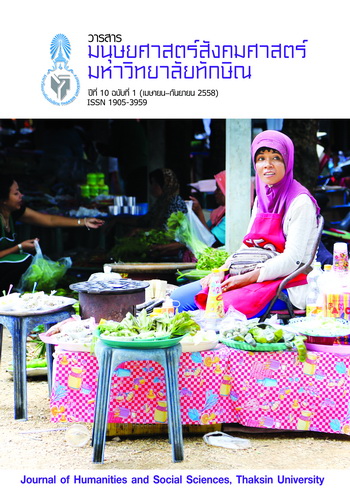กลยุทธ์การส่งเสริมความรับผิดชอบต่อ สังคมในธุรกิจรถจักรยานยนต์
คำสำคัญ:
กลยุทธ์, ความรับผิดชอบต่อสังคม, ธุรกิจรถจักรยานยนต์, Strategy, Corporate Social Responsibility, Motorcycle Businessบทคัดย่อ
การวิจัยมีวัตถุประสงค์ เพื่อศึกษากลยุทธ์การดำเนินงานด้าน CSR ในธุรกิจรถ จักรยานยนต์ เพื่อศึกษาการรับรู้และความคาดหวังของลูกค้าและพนักงานต่อ CSR ในธุรกิจรถจักรยานยนต์ และเพื่อพัฒนากลยุทธ์การส่งเสริม CSR ในธุรกิจรถจักรยานยนต์ กลุ่มตัวอย่างคือ ผู้ปฏิบัติงานด้าน CSR จำนวน 12 คน จาก 6 บริษัท ลูกค้า จำนวน 400 คน และพนักงาน จำนวน 100 คน ของบริษัท ผู้จำหน่ายรถจักรยานยนต์ในเขตภาคใต้ ผู้วิจัย เก็บข้อมูลด้วยการสัมภาษณ์ แบบสอบถาม และการสนทนากลุ่ม ผลการวิจัยพบว่า 1) กลยุทธ์การดำเนินงานด้าน CSR ในธุรกิจรถจักรยานยนต์ประกอบด้วย 9 ขั้นตอน โดยมีกิจกรรม 4 ด้าน 2) การรับรู้และความคาดหวัง ของลูกค้าและพนักงานต่อกิจกรรม CSR โดยรวมและรายด้านอยู่ในระดับมาก 3) ผลการพัฒนากลยุทธ์ พบว่า การรับรู้ ของลูกค้าและพนักงานที่มีต่อภาพลักษณ์และกิจกรรม CSR โดยรวมอยู่ในระดับมาก โดยรับรู้ด้านการดำเนินงานอย่างเป็นธรรมมากที่สุด รองลงมาคือ ด้านการพัฒนา สังคมและชุมชน น้อยที่สุดคือ ด้านสิ่งแวดล้อม ความพึงพอใจของผู้ใช้กลยุทธ์โดยรวม อยู่ในระดับมาก มีความพึงพอใจด้านภาพรวมของการใช้กลยุทธ์มากที่สุด รองลงมา คือ ด้านประโยชน์ต่อองค์กรธุรกิจ และน้อยที่สุดคือ ด้านขั้นตอนการใช้กลยุทธ์
The Strategies for Enhancing the Corporate Social Responsibility in Motorcycle Business
Piyanart Singchoo
Graduate students Educational Innovation Management for Development Nakhon Si Thammarat Rajabhat University
This research aimed to study operational strategies for implementing CSR in motorcycle business, study perceptions and expectations of customers and employees towards CSR in the motorcycle business, and develop strategies for enhancing the CSR in motorcycle business. The samples consisted of 12 CSR practitioners from 6 motorcycle companies, 400 customers and 100 employees of motorcycle dealers in the south of Thailand. The data were collected through interviews, questionnaires, and focus group interviews. The findings show that 1) strategies for implementing CSR in motorcycle business comprised of 9 procedures and consisting of 4 activities; 2) perceptions and expectations of customers and employees are high in overall in all aspects; and 3) results of strategy development show that overall perceptions of customers and the employees towards CSR image and activities are high – the highest perception is the operation with fairness, followed by social and community development and the lowest perception is about environment. In overall, the satisfaction of practitioners is high, while the most satisfaction aspect is overall satisfaction toward this strategy, following by benefits to the businesses, and the lowest is the strategic implementation procedures.



